Memoir of John Shakespear Bartley, 1916-1919 - Part 4
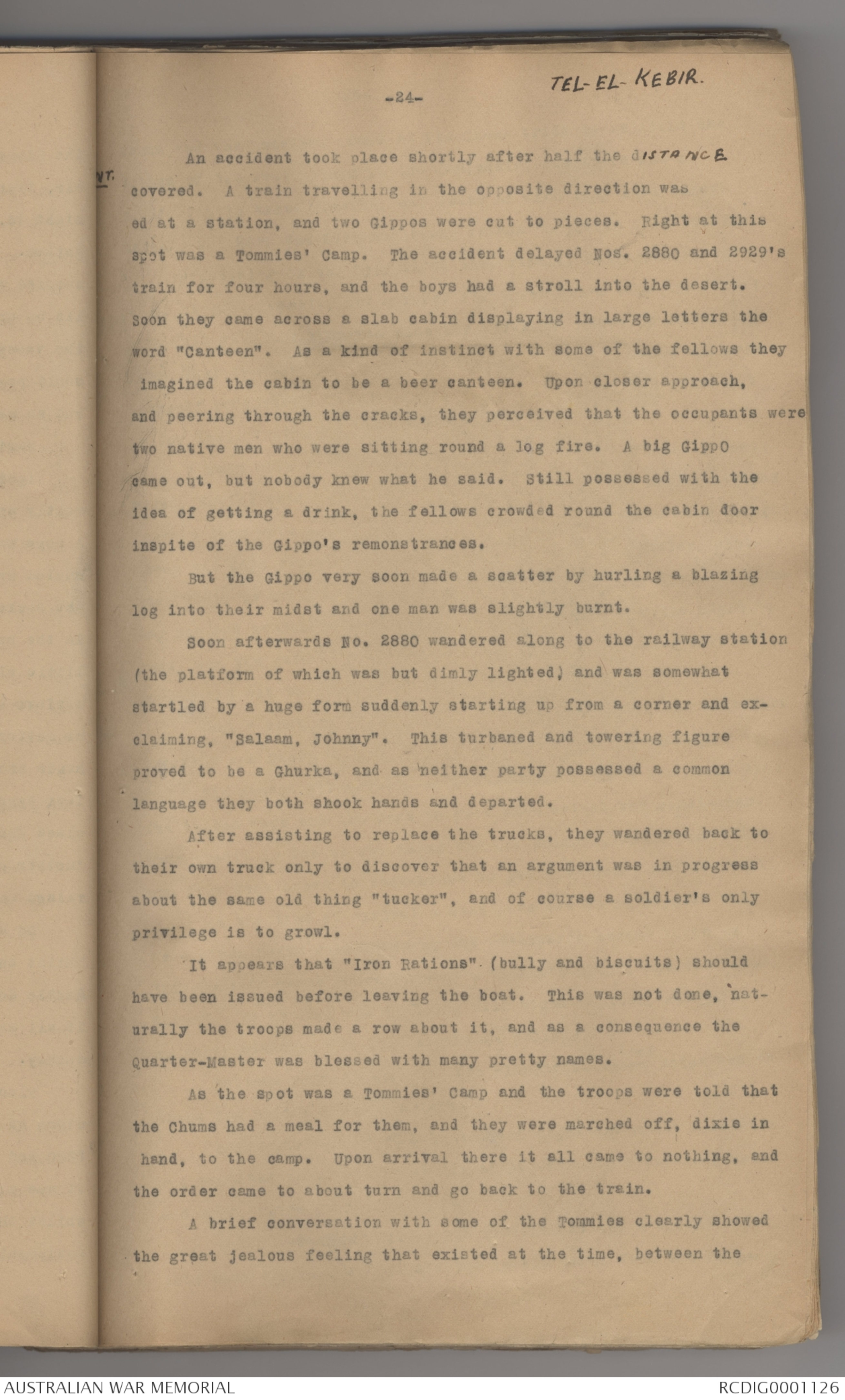
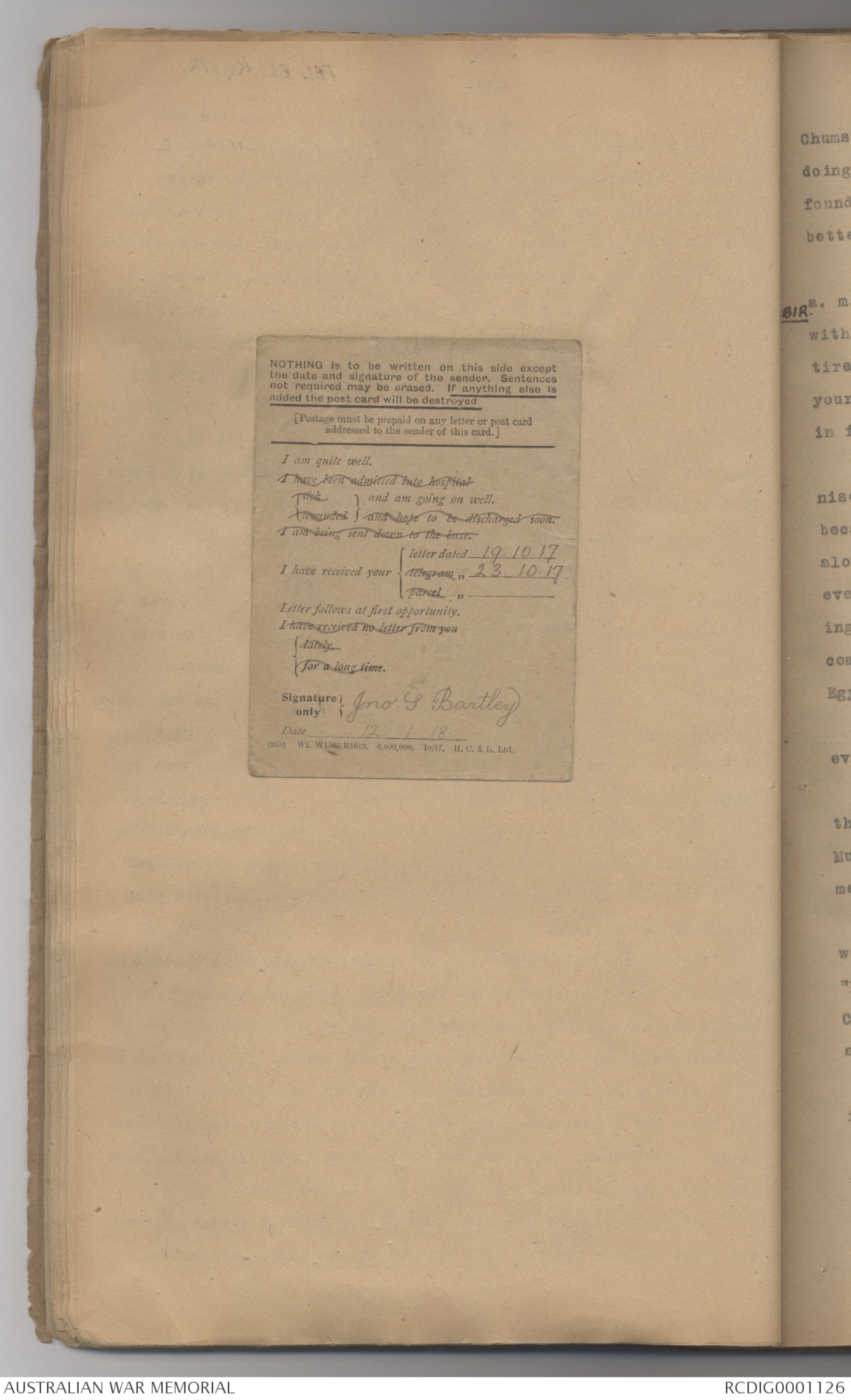
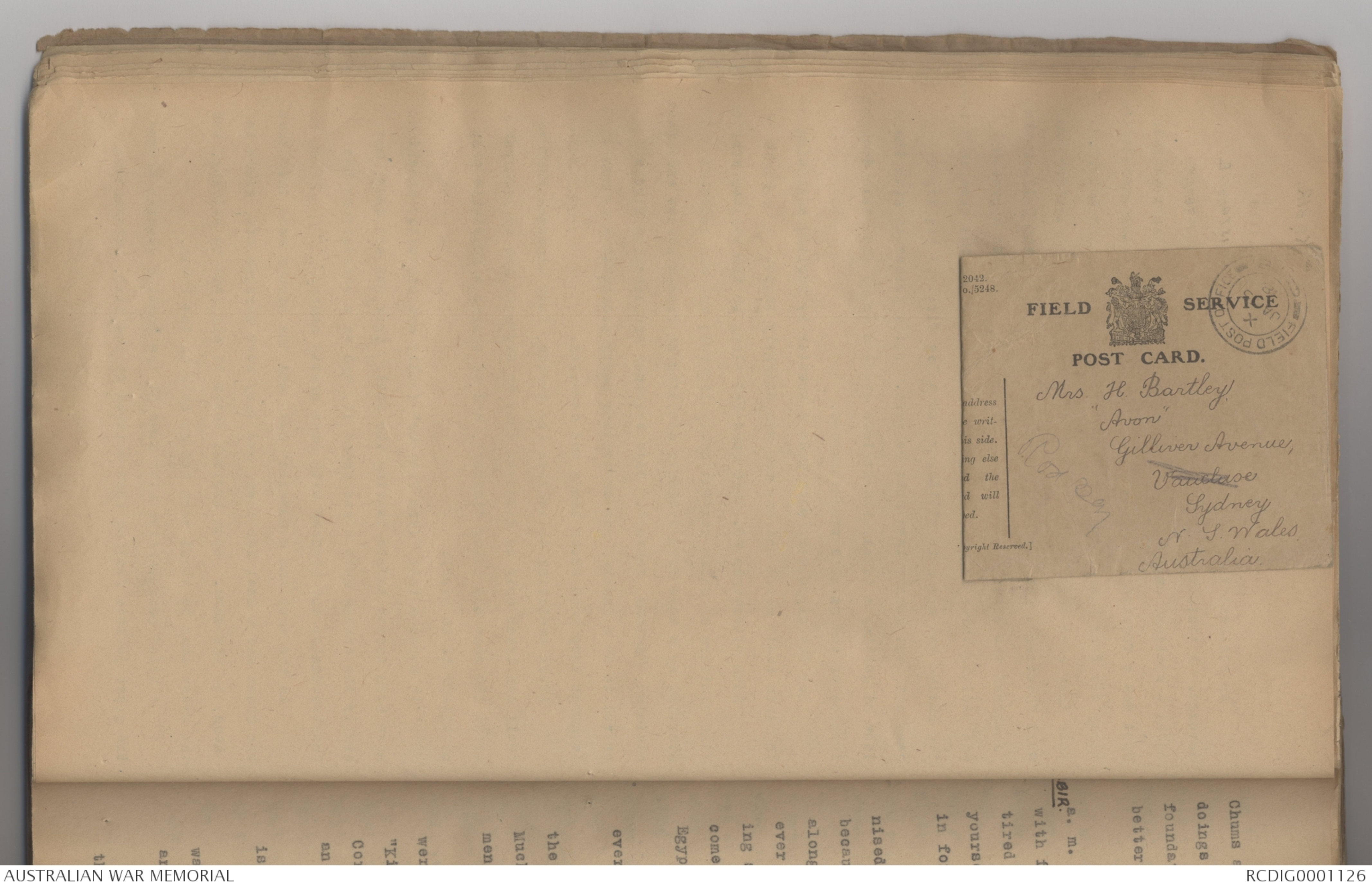
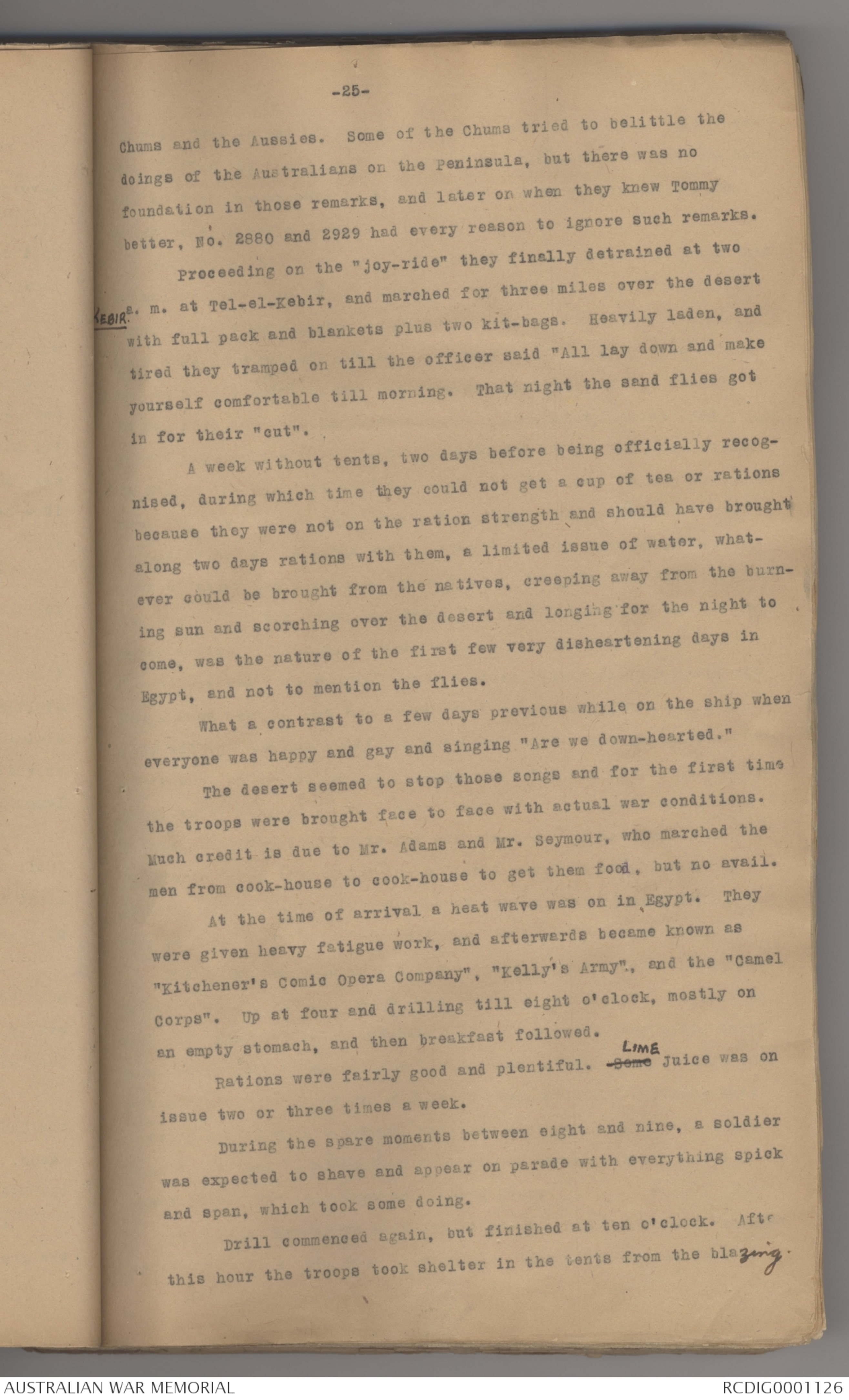
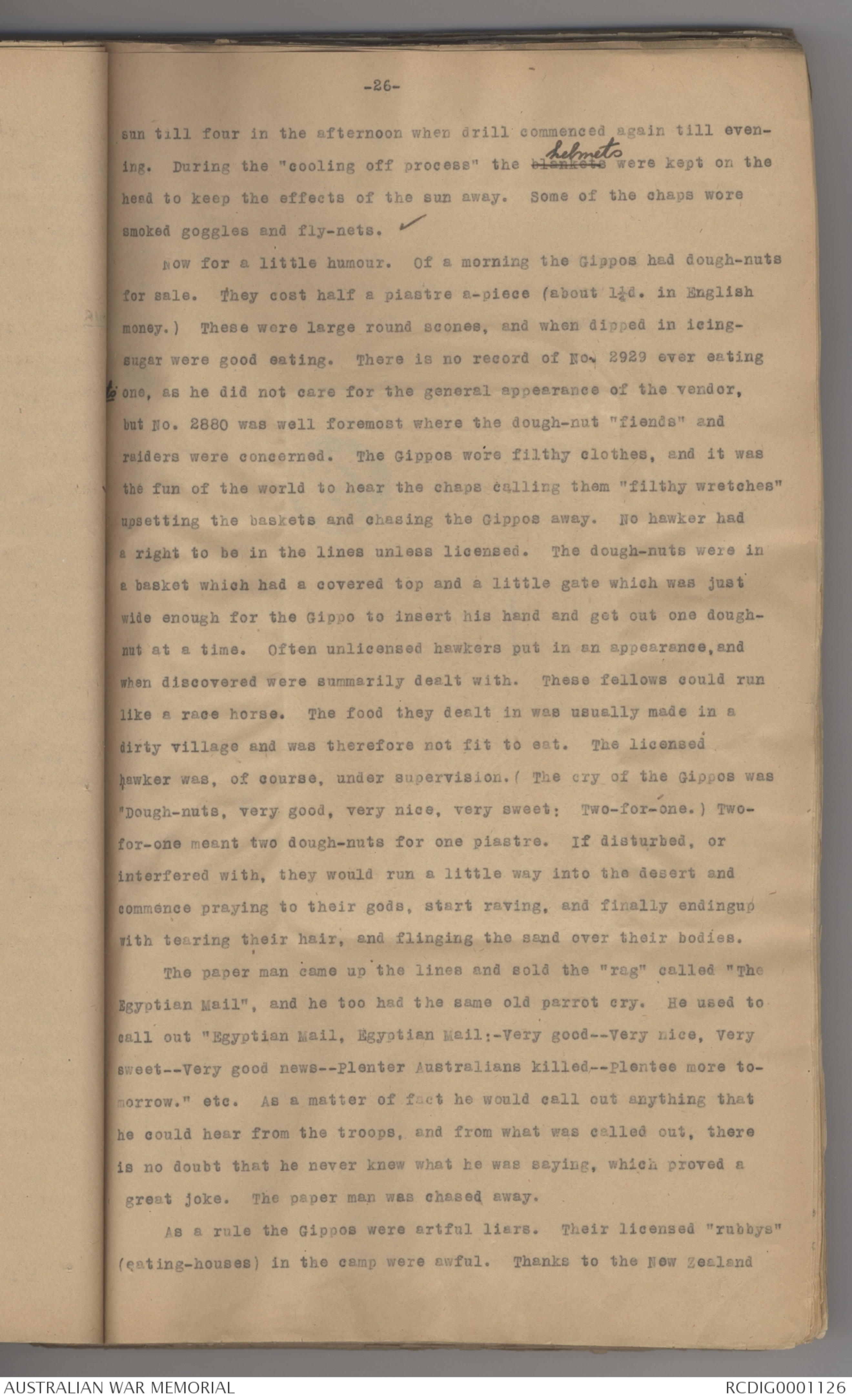
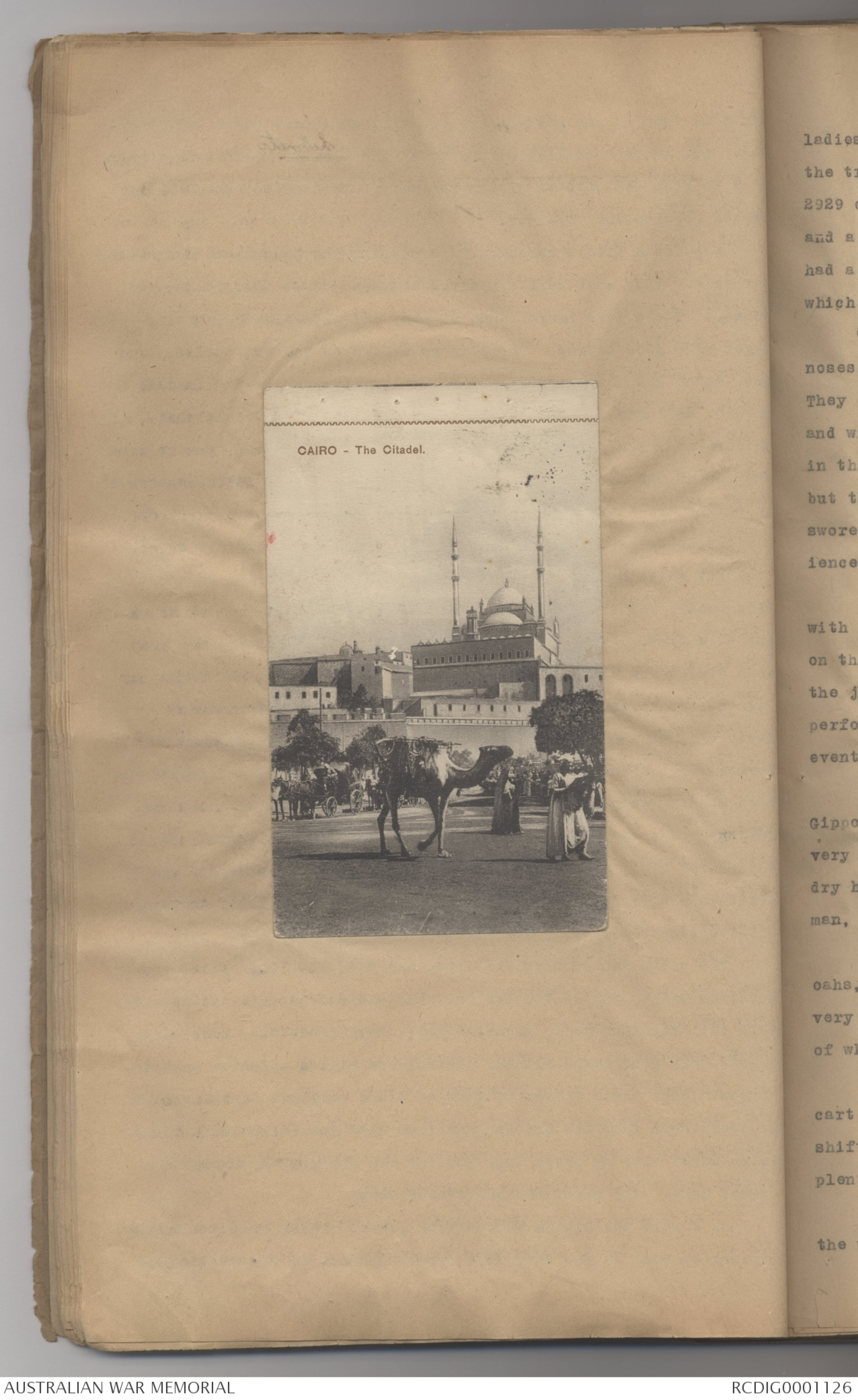
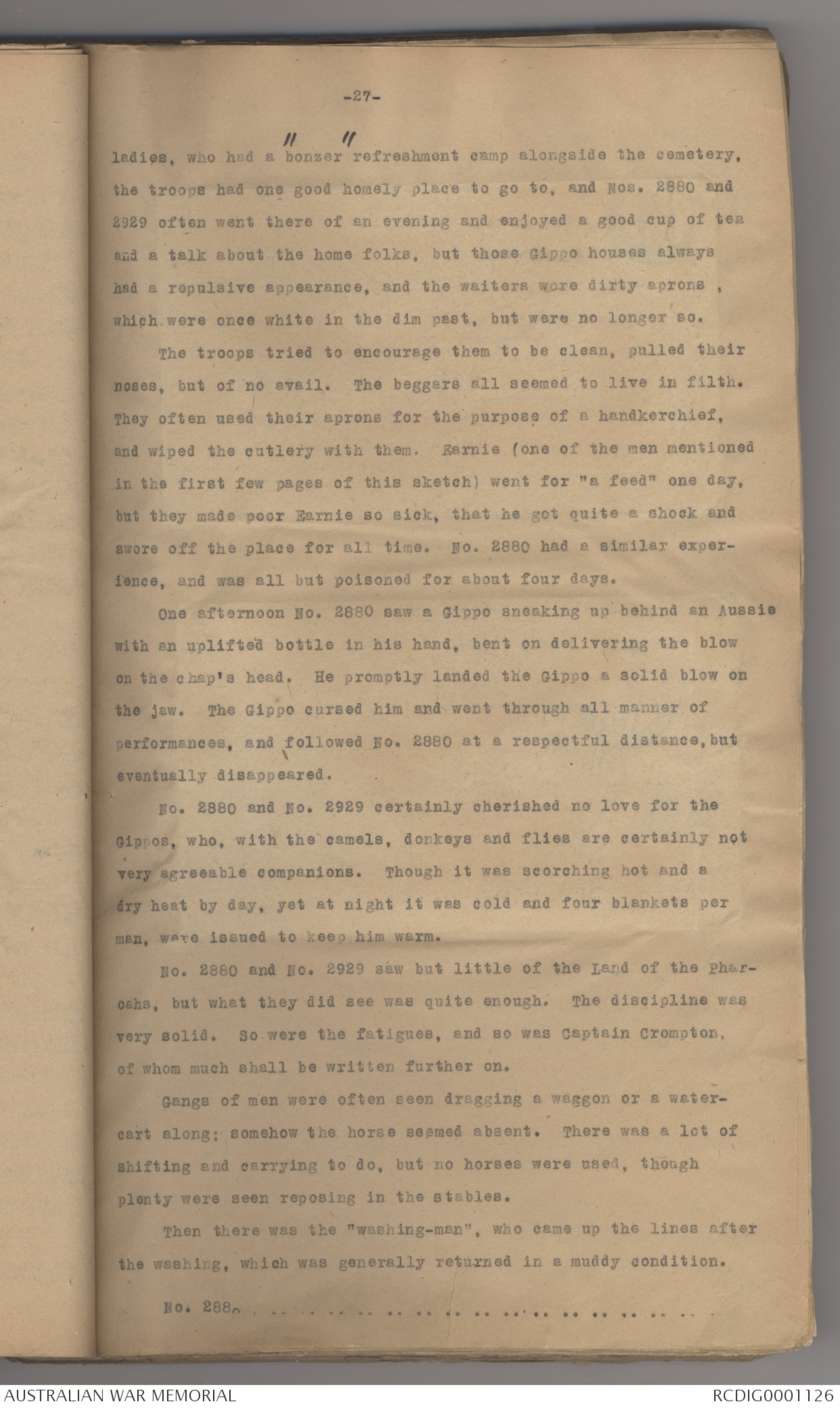
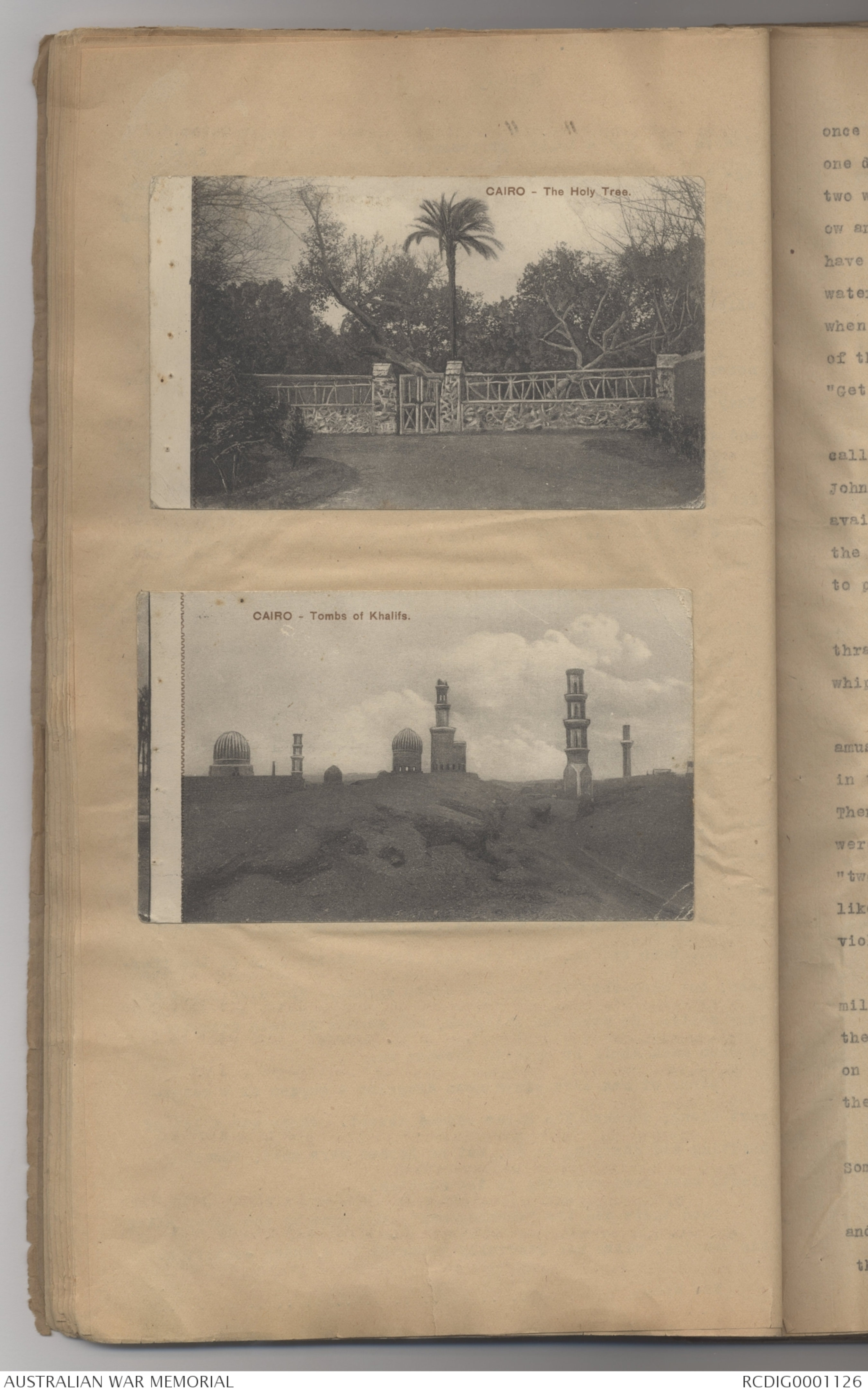
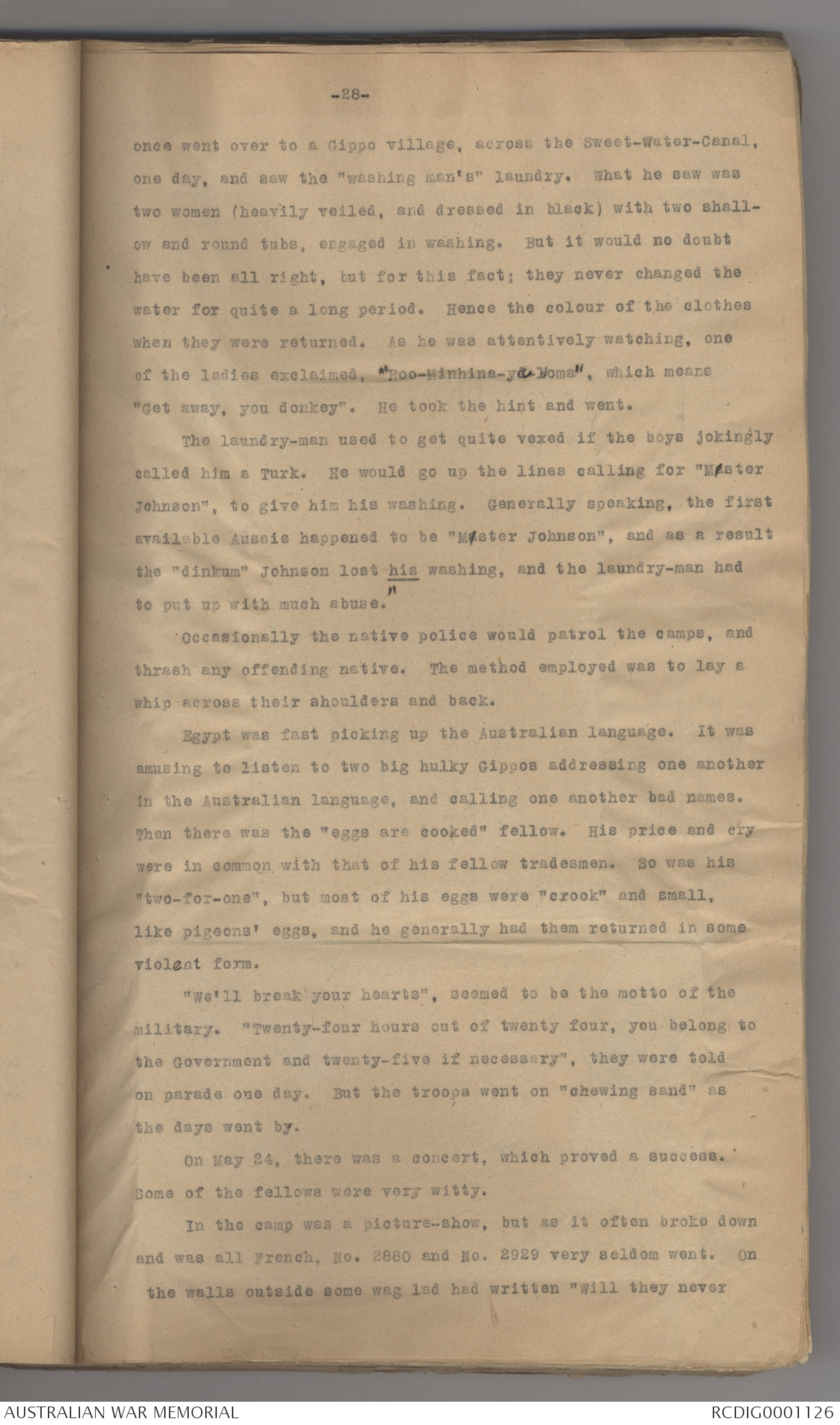
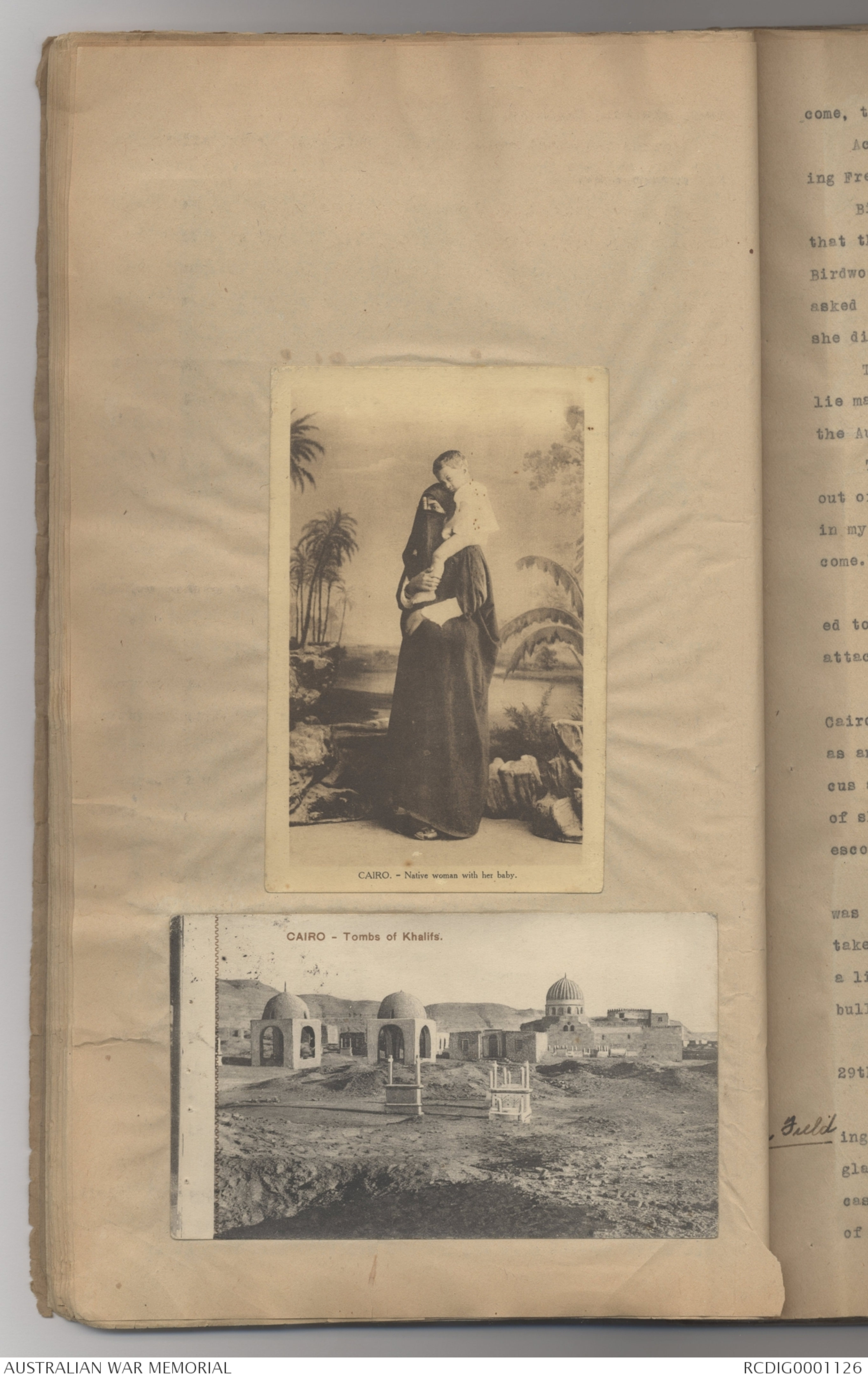
[*TEL-EL-KEBIR.*]
-24-
An accident took place shortly after half the DISTANCE
[*[[NT.?]]*] covered. A train travelling in the opposite direction was
ed at a station, and two Gippos were cut to pieces. Right at this
spot was a Tommies' Camp. The accident delayed Nos. 2880 and 2929's
train for four hours, and the boys had a stroll into the desert.
Soon they came across a slab cabin displaying in large letters the
word "Canteen". As a kind of instinct with some of the fellows they
imagined the cabin to be a beer canteen. Upon closer approach,
and peering through the cracks, they perceived that the occupants were
two native men who were sitting round a log fire. A big Gipp0
came out, but nobody knew what he said. Still possessed with the
idea of getting a drink, the fellows crowded round the cabin door
inspite of the Gippo's remonstrances.
But the Gippo very soon made a scatter by hurling a blazing
log into their midst and one man was slightly burnt.
Soon afterwards No. 2880 wandered along to the railway station
(the platform of which was but dimly lighted) and was somewhat
startled by a huge form suddenly starting up from a corner and exclaiming,
"Salaam, Johnny". This turbaned and towering figure
proved to be a Ghurka, and as neither party possessed a common
language they both shook hands and departed.
After assisting to replace the trucks, they wandered back to
their own truck only to discover that an argument was in progress
about the same old thing "tucker", and of course a soldier's only
privilege is to growl.
It appears that "Iron Rations" (bully and biscuits) should
have been issued before leaving the boat. This was not done, naturally
the troops made a row about it, and as a consequence the
Quarter-Master was blessed with many pretty names.
As the spot was a Tommies' camp and the troops were told that
the Chums had a meal for them, and they were marched off, dixie in
hand, to the camp. Upon arrival there it all came to nothing, and
the order came to about turn and go back to the train.
A brief conversation with some of the Tommies clearly showed
the great jealous feeling that existed at the time, between the
NOTHING is to be written on this side except
the date and signature of the sender. Sentences
not required may be erased. If anything else is
added the postcard will be destroyed.
[Postage must be prepaid on any letter or post card
addressed to the sender of this card.)
I am quite well.I have been admitted into hospitalsick } and am going on well.wounded} and hope to be discharged soon.I am being sent down to the base.
{ letter dated 19.10.17
I have received your {telegram " 23.10.17
{ par4cel "
Letter follows at first opportunity.I have received no letter from you
{ lately
{ for a long time.
Signature } Jno. S Bartley
only }
Date 12.1.18.
FIELD SERVICE
POST CARD.
Mrs H. Bartley
"Avon"
Gulliver Avenue,
Vaucluse
Sydney
N.S. Wales
Australia
-25-
Chums and the Aussies. Some of the Chums tried to belittle the
doings of the Australians on the Peninsula, but there was no
foundation in those remarks, and later on when they knew Tommy
better, No. 2880 and 2929 had every reason to ignore such remarks.
Proceeding on the "joy-ride" they finally detrained at two
a.m. at Tel-el-Kebir, and marched for three miles over the desert
[*KEBIR*] with full pack and blankets plus two kit-bags. Heavily laden, and
tired they tramped on till the officer said "All lay down and make
yourself comfortable till morning. That night the sand flies got
in for their "cut".
A week without tents, two days before being officially recognised,
during which time they could not get a cup of tea or rations
because they were not on the ration strength and should have brought
along two days rations with them, a limited issue of water, whatever
could be brought from the natives, creeping away from the burning
sun and scorching over the desert and longing for the night to
come, was the nature of the first few very disheartening days in
Egypt, and not to mention the flies.
What a contrast to a few days previous while on the ship when
everyone was happy and gay and singing "Are we down-hearted."
The desert seemed to stop those songs and for the first time
the troops were brought face to face with actual war conditions.
Much credit is due to Mr. Adams and Mr. Seymour, who marched the
men from cook-house to cook-house to get them food, but no avail.
At the time of arrival a heat wave was on in Egypt. They
were given heavy fatigue work, and afterwards became known as
"Kitchener's Comic Opera Company", "Kelly's Army", and the "Camel
Corps". Up at four and drilling till eight o'clock, mostly on
an empty stomach, and then breakfast followed.
Rations were fairly good and plentiful. Some LIME Juice was on
issue two or three times a week.
During the spare moments between eight and nine, a soldier
was expected to shave and appear on parade with everything spick
and span, which took some doing.
Drill commenced again, but finished at ten o'clock. [[After?]]
this hour the troops took shelter in the tents from the blazing
-26-
sun till four in the afternoon when drill commenced again till evening.
During the "cooling off process" the blankets helmets were kept on the
head to keep the effects of the sun away. Some of the chaps wore
smoked goggles and fly-nets. ✔
Now for a little humour. Of a morning the Gippos had dough-nuts
for sale. They cost half a piastre a-piece (about 1¼d. in English
money.) These were large round scones, and when dipped in icing-sugar
were good eating. There is no record of No 2929 ever eating
[*[[ts.?]]*] one, as he did not care for the general appearance of the vendor,
but No. 2880 was well foremost where the dough-nut "fiends" and
raiders were concerned. The Gippos wore filthy clothes, and it was
the fun of the world to hear the chaps calling them "filthy wretches"
upsetting the baskets and chasing the Gippos away. No hawker had
a right to be in the lines unless licensed. The dough-nuts were in
a basket which had a covered top and a little gate which was just
wide enough for the Gippo to insert his hand and get out one doughnut
at a time. Often unlicensed hawkers put in an appearance,and
when discovered were summarily dealt with. These fellows could run
like a race horse. The food they dealt in was usually made in a
dirty village and was therefore not fit to eat. The licensed
hawker was, of course, under supervision.( The cry of the Gippos was
"Dough-nuts, very good, very nice, very sweet: Two-for-one.) Two-for-one
meant two dough-nuts for one piastre. If disturbed, or
interfered with, they would run a little way into the desert and
commence praying to their gods, start raving, and finally endingup
with tearing their hair, and flinging the sand over their bodies.
The paper man came up the lines and sold the "rag" called "The
Egyptian Mail", and he too had the same old parrot cry. He used to
call out "Egyptian Mail, Egyptian Mail;-Very good--Very nice, Very
sweet--Very good news--Plenter Australians killed--Plentee more tomorrow."
etc. As a matter of fact he would call out anything that
he could hear from the troops, and from what was called out, there
is no doubt that he never knew what he was saying, which proved a
great joke. The paper man was chased away.
As a rule the Gippos were artful liars. Their licensed "rubbys"
(eating-houses) in the camp were awful. Thanks to the New Zealand
CAIRO - The Citadel.
Photograph - see original document
-27-
ladies, who had a "bonzer" refreshment camp alongside the cemetery,
the troops had one good homely place to go to, and Nos. 2880 and
2929 often went there of an evening and enjoyed a good cup of tea
and a talk about the home folks, but those Gippo houses always
had a repulsive appearance, and the waiters wore dirty aprons,
which were once white in the dim past, but were no longer so.
The troops tried to encourage them to be clean, pulled their
noses, but of no avail. The beggars all seemed to live in filth.
They often used their aprons for the purpose of a handkerchief,
and wiped the cutlery with them. Earnie (one of the men mentioned
in the first few pages of this sketch) went for "a feed" one day,
but they made poor Earnie so sick, that he got quite a shock and
swore off the place for all time. No. 2880 had a similar experience,
and was all but poisoned for about four days.
One afternoon No. 2880 saw a Gippo sneaking up behind an Aussie
with an uplifted bottle in his hand, bent on delivering the blow
on the chap's head. He promptly landed the Gippo a solid blow on
the jaw. The Gippo cursed him and went through all manner of
performances, and followed No. 2880 at a respectful distance, but
eventually disappeared.
No. 2880 and No. 2929 certainly cherished no love for the
Gippos, who, with the camels, donkeys and flies are certainly not
very agreeable companions. Though it was scorching hot and a
dry heat by day, yet at night it was cold and four blankets per
man, were issued to keep him warm.
No. 2880 and No. 2929 saw but little of the Land of the Pharoahs,
but what they did see was quite enough. The discipline was
very solid. So were the fatigues, and so was Captain Crompton,
of whom much shall be written further on.
Gangs of men were often seen dragging a waggon or a water-cart
along: somehow the horse seemed absent. There was a lot of
shifting and carrying to do, but no horses were used, though
plenty were seen reposing in the stables.
Then there was the "washing-man", who came up the lines after
the washing, which was generally returned in a muddy condition.
No. 2880 [[?]]
CAIRO - The Holy Tree
Photograph - see original document
CAIRO - Tombs of Khalifa.
Photograph - see original document
-28-
once went over to a Gippo village, across the Sweet-Water-Canal,
one day, and saw the "washing man's" laundry. What he saw was
two women (heavily veiled, and dressed in black) with two shallow
and round tubs, engaged in washing. But it would no doubt
have been all right, but for this fact; they never changed the
water for quite a long period. Hence the colour of the clothes
when they were returned. As he was attentively watching, one
of the ladies exclaimed, "Roo-Minhina-ya-Homa", which means
"Get away, you donkey". He took the hint and went.
The laundry-man used to get quite vexed if the boys jokingly
called him a Turk. He would go up the lines calling for "Mister
Johnson", to give him his washing. Generally speaking, the first
available Aussie happened to be "Mister Johnson", and as a result
the "dinkum" Johnson lost his washing, and the laundry-man had
to put up with much abuse."
Occasionally the native police would patrol the camps, and
thrash any offending native. The method employed was to lay a
whip across their shoulders and back.
Egypt was fast picking up the Australian language. It was
amusing to listen to two big hulky Gippos addressing one another
in the Australian language, and calling one another bad names.
Then there was the "eggs are cooked" fellow. His price and cry
were in common with that of his fellow tradesmen. So was his
"two-for-one", but most of his eggs were "crook" and small,
like pigeons' eggs. and he generally had them returned in some
violent form.
"We'll break your hearts", seemed to be the motto of the
military, "Twenty-four hours out of twenty four, you belong to
the Government and twenty-five if necessary", they were told
on parade one day. But the troops went on "chewing sand" as
the days went by.
On May 24, there was a concert, which proved a success.
Some of the fellows were very witty.
In the camp was a picture-show, but as it often broke down
and was all French, No. 2880 and No. 2929 very seldom went. On
the walls outside some wag lad had written "Will they never
CAIRO. - Native woman with her baby.
Photograph - see original document
CAIRO - Tombs of Khalifs.
Photographs - see original document
 Ray Stenhouse
Ray StenhouseThis transcription item is now locked to you for editing. To release the lock either Save your changes or Cancel.
This lock will be automatically released after 60 minutes of inactivity.